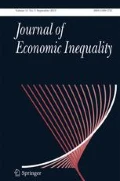Abstract
Previous studies find that some social groups are stuck in poverty traps because of network effects. However, these studies do not carefully analyze how these groups overcome low human capital investment activities. Unlike previous studies, the model in this paper includes network externalities in both the human capital investment stage and the subsequent career stages. This implies that not only the current network quality, but also the expectations about future network quality affect the current investment decision. Consequently, the coordinated expectation among the group members can play a crucial role in the determination of the final state. We define “overlap” for some initial skill ranges, whereby the economic performance of a group can be improved simply by increasing expectations of a brighter future. We also define “poverty trap” for some ranges, wherein a disadvantaged group is constrained by its history, and we explore the egalitarian policies to mobilize the group out of the trap.
Similar content being viewed by others
References
Acemoglu, D.: A microfoundation for social increasing returns in human capital accumulation. Q. J. Econ. 111, 779–804 (1996)
Adsera, A., Ray, D.: History and coordination failure. J. Econ. Growth 3, 267–276 (1998)
Becker, G., Tomes, N.: An equilibrium theory of the distribution of income and intergenerational mobility. J. Polit. Econ. 87, 1153–89 (1979)
Bisin, A., Verdier, T.: The economics of cultural transmission and the dynamics of preferences. J. Econ. Theory 97, 298–319 (2001)
Bowles, S., Loury, G., Sethi, R.: Group Inequality, Unpublished Manuscript. Barnard College, Columbia University (2007)
Castilla, E.: Social networks and employee performance in a call center. Am. J. Sociol. 110, 1243–83 (2005)
Calvó-Armengol, A., Jackson, M.: The effects of social networks on employment and inequality. Am. Econ. Rev. 94, 426–454 (2004)
Calvó-Armengol, A., Jackson, M.: Networks in labor markets: wage and employment dynamics and inequality. J. Econ. Theory 132, 27–46 (2007)
Coate, S., Loury, G.C.: Will affirmative-action policies eliminate negative stereotype. Am. Econ. Rev. 83, 1220–1240 (1993)
Fryer, R., Loury, G.C.: Valuing identity. J. Polit. Econ., 123 (2013)
Granovetter, M.S.: Getting A Job: A Study of Contracts and Careers. University of Chicago Press, Chicago (1975)
Hauk, E., Saez-Marti, M.: On the cultural transmission of corruption. J. Econ. Theory 107(2), 311–335 (2002)
Holzer, H.J.: Search method use by unemployed youth. J. Labor Econ., 1–20 (1988)
Jackson, M.: Social and Economic Networks. Princeton University Press, Princeton and Oxford (2008)
Kremer, M.: The O-ring theory of economic development. Q. J. Econ. 108, 551–575 (1993)
Krugman, P.: History versus expectations. Q. J. Econ. 106, 651–667 (1991)
Loury, G.C.: Intergenerational transfers and the distribution of earnings. Econometrica 49, 843–867 (1981)
Lundberg, S., Startz, R.: On the persistence of racial inequality. J. Labor Econ. 16, 292–322 (1998)
Matsuyama, K.: Increasing returns, industrialization, and indeterminacy of equilibrium. Q. J. Econ. 106, 617–650 (1991)
Montgomery, J.: Social networks and labor market outcomes: toward an economic analysis. Am. Econ. Rev. 815, 1408–18 (1991)
Montgomery, J.: Weak ties, employment and inequality: an equilibrium analysis. Am. J. Sociol. 99, 1212–36 (1994)
Murphy, K., Shleifer, A., Vishny, R.: Industrialization and the big push. J. Polit. Econ. 97, 1003–26 (1989)
Ozgen, E., Baron, R.A.: Social sources of information in opportunity recognition: effects of mentors, industry networks, and professional forums. J. Bus. Ventur. 22, 174–192 (2007)
Rockoff, J.E.: Does mentoring reduce turnover and improve skills of new employees? Evidence from teachers in New York City. NBER Working Papers No. 13868 (2008)
Author information
Authors and Affiliations
Corresponding author
Additional information
We are indebted to Rajiv Sethi, Oded Galor, Kenneth Chay and two anonymous referees for valuable comments and suggestions for improvement. We benefited greatly from discussions with Matthew Jackson, Andrew Foster and Yeon-Koo Che, and from the comments of seminar participants at Brown University, the University of London (Queen Mary), Korea University, Yonsei University, Sogang University and others. This research was supported by a 2013 Research Grant from Sangmyung University. All remaining errors are ours.
Rights and permissions
About this article
Cite this article
Kim, YC., Loury, G.C. Social externalities, overlap and the poverty trap. J Econ Inequal 12, 535–554 (2014). https://doi.org/10.1007/s10888-013-9268-1
Received:
Accepted:
Published:
Issue Date:
DOI: https://doi.org/10.1007/s10888-013-9268-1




